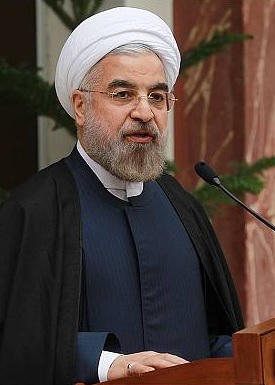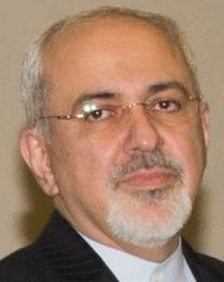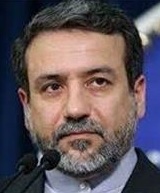The following are remarks from top leaders on the anniversary of the nuclear deal’s implementation day, January 16. The agreement between Iran and the world’s six major powers —Britain, China, France, Germany, Russia and the United States —significantly limited Tehran’s nuclear program in exchange for sanctions relief.
United States
President Barack Obama
 Today marks the one-year anniversary of the implementation of the Joint Comprehensive Plan of Action (JCPOA) - a deal that has achieved significant, concrete results in making the United States and the world a safer place. This historic understanding reached between the United States, France, the United Kingdom, Germany, China, Russia, the European Union and Iran has rolled back the Iranian nuclear program and verifiably prevents Iran from obtaining a nuclear weapon.
Today marks the one-year anniversary of the implementation of the Joint Comprehensive Plan of Action (JCPOA) - a deal that has achieved significant, concrete results in making the United States and the world a safer place. This historic understanding reached between the United States, France, the United Kingdom, Germany, China, Russia, the European Union and Iran has rolled back the Iranian nuclear program and verifiably prevents Iran from obtaining a nuclear weapon.
One year ago, the International Atomic Energy Agency (IAEA) verified that Iran had fulfilled key commitments spelled out under the JCPOA. Instead of steadily expanding, Iran's nuclear program faces strict limitations and is subject to the most intrusive inspection and verification program ever negotiated to monitor a nuclear program. Iran reduced its uranium stockpile by 98 percent and removed two-thirds of its centrifuges. Meanwhile, Iran has not enriched any uranium at the Fordow facility nor used advanced centrifuges to enrich. In short, Iran is upholding its commitments, demonstrating the success of diplomacy.
While this deal was intended to address Iran's nuclear program, we have remained steadfast in opposing Iran's threats against Israel and our Gulf partners and its support for violent proxies in places like Syria and Yemen. We continue to be deeply concerned about U.S. citizens unjustly imprisoned in Iran. And our sanctions on Iran for its human rights abuses, its support for terrorist groups, and its ballistic missile program will remain until Iran pursues a new path on those issues. There is no question, however, that the challenges we face with Iran would be much worse if Iran were also on the threshold of building a nuclear weapon.
The United States must remember that this agreement was the result of years of work, and represents an agreement between the world's major powers - not simply the United States and Iran. Moreover, the Iran deal must be measured against the alternatives - a diplomatic resolution that prevents Iran from obtaining a nuclear weapon is far preferable to an unconstrained Iranian nuclear program or another war in the Middle East.
—Jan. 16, 2016, in a statement
Secretary of State John Kerry
 On the one-year anniversary of Implementation Day under the Joint Comprehensive Plan of Action (JCPOA), we mark an historic understanding that prevents Iran from obtaining a nuclear weapon and demonstrated the power of sustained, principled, multilateral diplomacy to address major international challenges.
On the one-year anniversary of Implementation Day under the Joint Comprehensive Plan of Action (JCPOA), we mark an historic understanding that prevents Iran from obtaining a nuclear weapon and demonstrated the power of sustained, principled, multilateral diplomacy to address major international challenges.
Implementing this highly technical deal has required diligent efforts by all participants -- the P5+1, the European Union, and Iran. As the International Atomic Energy Agency (IAEA) continues to verify the deal through intensive access and monitoring provisions, there is no doubt that the deal is working and all participants are keeping their commitments.
Iran has shipped out 98 percent of its enriched uranium, dismantled two-thirds of its centrifuges, filled its plutonium reactor with concrete and implemented the most rigorous nuclear inspection regime ever negotiated. Just today, the IAEA confirmed that Iran has removed equipment from the Fordow Fuel Enrichment Plant before the agreed 1 year deadline in order to meet another commitment under the JCPOA. The United States and our partners have also fully implemented our commitments to lift nuclear-related sanctions, and we will continue to uphold our commitments as long as Iran continues to abide by the deal.
The JCPOA resolved a major nuclear threat without firing a shot or sending a single soldier into combat. It was endorsed unanimously by the United Nations Security Council and earned the support of more than 100 countries across the globe. We still have serious differences with the Government of Iran, and will continue to push back on its support for terrorism, disregard for human rights, and destabilizing regional activities. But the United States, our partners and allies in the Middle East, and the entire international community are safer today because of the JCPOA.
—Jan. 16, 2016, in a statement
Iran
President Hassan Rouhani
 "In JCPOA [Joint Comprehensive Plan of Action], we proved to the world that Iranian nation and state are honest and those who made false accusations against the state, should be ashamed of themselves in the history of the world."
"In JCPOA [Joint Comprehensive Plan of Action], we proved to the world that Iranian nation and state are honest and those who made false accusations against the state, should be ashamed of themselves in the history of the world."
"In nuclear negotiations and the JCPOA, we were victorious from political viewpoint because we told the world that Iran was not a state to be treated with security measures. We wanted to tell the world that Iran is a country that can have an effective and active role in different issues of the world and Iran's absence in political stages of the region and the world was detrimental to the entire world.”
"Some major countries, especially the US, are obstructing implementation of the JCPOA. This is what we expected from the beginning. When a government is hostile towards another, it is clear that it will not use all its might for implementation of an agreement.”
"We have stood, and will stand powerfully against lack of commitment to promises. I assure people that we have acted authoritatively. Our national interest is fundamental for us and we will always consider this."
“Mr. Trump has not expressed satisfaction with the Iran nuclear deal so far and has said the deal is not a good deal. … These claims are nothing but a slogan.”
“The JCPOA is not something that someone in another country, following his election as president, decides whether he likes or dislikes it. The JCPOA has created a new global environment and it should be taken care of with prudence. It is a win—win deal.”
“Without the deal, that would have been $32 or $33 billion. If not for the deal, where would we have deducted this money from? From nurses’, from teachers’ salary? Put health and treatment projects on hold?” “What were we to do?”
—Jan. 17, 2017, in a press conference via his website, Al Monitor and The New York Times
Foreign Minister Mohammad Javad Zarif
 “Whatever he [President-elect Donald Trump] does to the nuclear deal, we’re not worried about it, because we have our own options.”
“Whatever he [President-elect Donald Trump] does to the nuclear deal, we’re not worried about it, because we have our own options.”
“As I’ve said before, President-elect Trump likes surprises and we will make him surprised.”
—Jan. 19, 2017 in remarks in Kuala Lumpur
Deputy Foreign Minister Abbas Araghchi
 "Mr. Trump would only either accept or reject the deal; JCPOA is a finished deal for Iran and the country will never sit to renegotiate a deal which has international powers' support."
"Mr. Trump would only either accept or reject the deal; JCPOA is a finished deal for Iran and the country will never sit to renegotiate a deal which has international powers' support."
“The US financial system has not allowed Iran to trade in dollars. This creates huge problems almost insurmountable in international banking. Other obstacles include anti-money laundering rules and measures to watch over financial support for terrorism. Nevertheless, Iran’s banking system never felt in the dead end and managed to circumvent the hurdles to do transactions with global system.”
“Now, Iran exports 2.5 million barrels of crude per day, while before JCPOA, it was severely restricted to well below 1 million barrels; the industry enjoy modest openings in terms of receiving oil money which had been blocked in foreign banks before the JCPOA.”
“This is inaccurate to assume that the JCPOA will make Iran and the US to embrace a détente and a thaw in decades-old ice in bilateral relations; we just managed to negotiate our nuclear deal and no novelty would be expected.”
“It is possible to have negotiations over the issue of the implementation [of the JCPOA] … and their [the United States] not honoring their commitment appropriately. But the political negotiations have ended, and we neither have nor will enter political negotiations with the current US government nor the future government regarding the JCPOA and its future, unless [our] orders [from the Iranian leadership] change. But at present there is no prospect of this.”
“The Americans had waived the ISA [Iran Sanctions Act], and when the Congress extended it they waived it immediately. The US president is committed under the JCPOA to waive the anti-JCPOA laws, and it makes no difference who the president is. At present, the [ISA] law is not enforced.”
“During the past year, we have faced failures in [US] commitment [to the nuclear deal], delays, postponement policies, and we do not expect anything other than this from America.”
“The accusations that are being made in America against Obama and his team are that they have been defeated in the international arena, and they portray the Islamic Republic of Iran as the main winner of the [nuclear] agreement. In the [US presidential] election, the candidate who won [Trump] blamed Obama and said that he had signed the most dangerous and disastrous agreement in the history of America.”
“The sanctions were adopted against three key areas, including energy, shipping and banking. … I decisively state that the situation has been normalized in these areas.”
—Jan. 15, 2017, in a press conference via Mehr News and Al Monitor
Head of the Atomic Energy Organization of Iran Ali Akbar Salehi
“Tearing up the deal would mean that our program would resume in a new manner that would shock Washington.”
—Jan. 17, 2017, according to the press
European Union
E.U. High Representative for Foreign Affairs and Security Policy Federica Mogherini
The 16th of January marks the first anniversary of the implementation of the Joint Comprehensive Plan of Action (JCPOA), agreed between the European Union, China, Germany, France, Russia, the United Kingdom and the United States, and Iran. One year after the beginning of the implementation period, it is clear that the JCPOA is working for all.
In the course of this year, JCPOA participants have powerfully demonstrated their full commitment to respect and implement the deal. The seriousness with which they have done so sends a reassuring signal to the international community of Iran's adherence to a civilian nuclear programme exclusively for peaceful purposes. It also conveys an important and encouraging message to the Iranian government and people.
Iran has delivered on its nuclear related commitments as confirmed by the four reports issued by the International Atomic Energy Agency. This is now a key pillar of a strengthened international non-proliferation agenda. For their part, the UN, EU and US have lifted their nuclear-related economic sanctions as promised in the Agreement. As a result there has been a surge in bilateral trade and investment with Iran, contributing to better living prospects for the benefit of all.The full and effective implementation throughout the entire lifetime of the JCPOA remains essential. As coordinator of the work of the Joint Commission, through the High Representative's role, the EU has clearly affirmed its resolute commitment to this objective. The rigorous implementation of commitments by all sides is the best way to continue to build trust, to strengthen the JCPOA and to overcome the hurdles that are part of all comprehensive and far-reaching deals.
The JCPOA is a multilateral endeavour, achieved through diplomatic means and endorsed by a United Nations Security Council resolution. It was born out of the efforts of the E3/EU+3 and Iran, but it now belongs to the entire international community. The JCPOA provides benefits for all and creates opportunities for improved regional cooperation that should be seized by all.
The EU will continue to work hand in hand with all those willing to contribute to its full implementation and in achieving the objectives which brought us together.
—Jan. 16, 2016, in a statement
